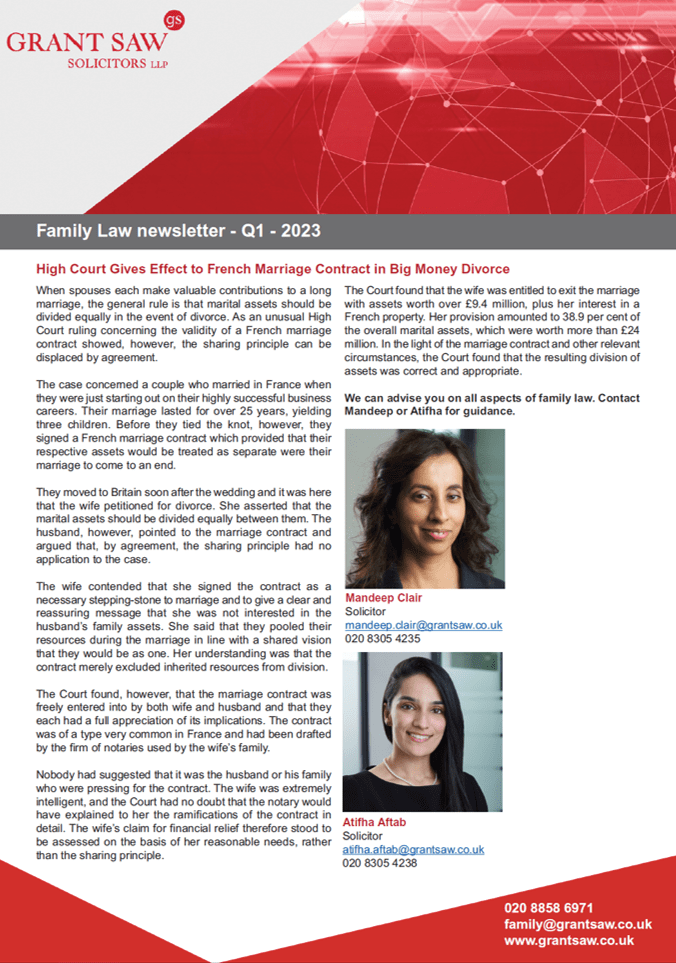Why would someone need this service?
If a person dies without leaving a valid Will, their assets will pass according to a set criteria, known as the ‘Intestacy Rules’. The exception to this is where there are any property or assets (such as a bank account) which is jointly owned by the Deceased and another living person.
If a property is jointly held, there will need to be an investigation as to whether that property was held as either a “joint tenancy” or as “tenants in common”. Generally, the Deceased’s share of a property held on a joint tenancy basis passes automatically to the other surviving person. Whereas, if the property is held as tenants in common, the Deceased’s share of the property will pass according to criteria set out in the Intestacy Rules.
How an intestate estate will ordinarily be distributed can be properly considered at the Government’s website: https://www.gov.uk/inherits-someone-dies-without-will
Common instances where matters become contested, where there is no Will, include the following situations:
a) Where an unmarried partner of the Deceased is either not provided for, or inadequately provided for. Under an intestacy, an unmarried partner is not entitled to benefit according to the Intestacy Rules. A claim however could potentially be made under The Inheritance (Provision for Family and Dependants) Act 1975. Further information regarding such a claim can be found here.
b) Where the Deceased separated from their husband/wife (often may years ago) but did not proceed to a formal divorce. In this instance, the Deceased’s estranged spouse will be entitled to receive a sum up to at least £270,000 (assuming there are sufficient assets within the estate to this value). Again, it is possible that a claim could be made by someone who feels that they have been unfairly excluded from benefiting from the Deceased’s estate under The Inheritance (Provision for Family and Dependants) Act 1975.
Occasionally, there are instances where a person may be concerned that either the estate assets will not be distributed in the manner that they should be, or alternatively, that the estate assets have already been distributed and they have not received their fair share of the Deceased’s estate.
It could also be claimed that a Deceased’s estate should not be treated on an intestacy basis because for example, it is believed that a valid Will does exist but for whatever reason that document is being ignored.
How long is the legal process when challenging the validity of an intestacy or the correct distribution of an intestacy?
If a claim is being made under The Inheritance (Provision for Family and Dependants) Act 1975, this must be issued at court within six months of the date of a Grant of Letters of Administration being obtained. In some instances, it may be appropriate to enter a Caveat to prevent a Grant from being issued. Further information regarding obtaining a Caveat can be found here.
Generally, however, it can take many months to resolve a dispute concerning a challenge to an intestate estate. If it is necessary to issue proceedings at Court, it may take a period of 12 to 18 months for there to be a decision reached by the Court. The majority of matters do not proceed to trial, however. Ordinarily at some stage, an agreement is reached between the parties to find a resolution.
Who can claim under the Inheritance Act?
Those who can make a claim under the Inheritance Act include:
- The spouse or civil partner of the Deceased
- A former spouse or civil partner of the Deceased provided they have not remarried or entered a new civil partnership
- Children of the Deceased
- A person cohabiting with the Deceased for a minimum of two years prior to their death
- A person that was financially dependent on the Deceased
Is it expensive?
When you first consult with us, we will provide you with an estimate of the potential costs. Under certain circumstances, we may be able to offer a Conditional Fee Agreement, otherwise known as a “no win, no fee” arrangement. There are various funding options available for consideration, further information can be found here.
What should people consider before calling?
It would be helpful if various details were to hand, such as the date of death and a brief summary of the “family tree” – i.e. whether the Deceased was married and if they had children and if so, how many children are living.
Meet the Contested trust and probate disputes team















































